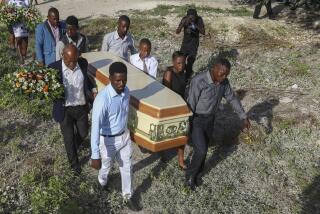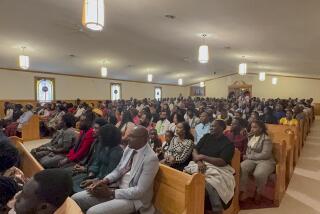Wave of Kidnappings Heightens Sense of Terror in Haitian Capital
PORT-AU-PRINCE, Haiti â Maryse Gilbertâs cellphone lighted up with her husbandâs number at 7 a.m., half an hour after he was kidnapped in front of the private high school he founded nearly three decades ago in the upscale Port-au-Prince neighborhood of Pacot.
âIt was one of the kidnappers, and he told me, âYour husband was very arrogant so we had to shoot him in both legs,â â Gilbert recalled of the June 1 conversation. âThen he told me: âUsually we donât put bullets in peopleâs legs. We put them in their heads.â â
Jean-Gerard Gilbert was put on the line just long enough to confirm that he was wounded and that his wife should do as she had been instructed: Deliver $200,000 in cash to the kidnappers by noon.
As with other sky-high demands made by gangsters who have snatched hundreds of victims in the last two months, the abductors agreed to settle for significantly less: $15,000.
Unlike most other recent cases, however, Gilbert didnât surface after the ransom payment. His wife believes he is dead. A diabetic with hypertension, she speculates that he either bled to death from his wounds or went into a diabetic coma before the medications sent along with the money could reach him. But no body has been found.
âEverybody is afraid,â Maryse Gilbert said from the garden of her suburban home. âIâm even more afraid now that Iâm alone with my kids.â
Police officials believe that armed supporters of exiled former President Jean-Bertrand Aristide are behind many of the kidnappings. In the last nine months, violence by Aristide loyalists and Haitian police retaliations have killed more than 700 people and sown an atmosphere of paralyzing terror.
Gangland shootouts have taken their toll mostly in the teeming slums of Port-au-Prince, the capital. The kidnapping wave, by contrast, has targeted politicians, doctors, businesspeople, foreigners and even those thought to have access to a few hundred dollars.
Fatalities have been few, but the abductions have spurred an exodus of the middle class from the capital, shuttered businesses and stalled efforts to hold elections this fall that could restore constitutional order.
Gessy Coicou, spokeswoman for the Haitian National Police, believes that the kidnapping wave is a strategic move to ratchet up the violence by pro-Aristide gangsters to disrupt economic recovery and prevent the elections.
âItâs not being done just to get money,â Coicou said. âWitnesses tell us the same story in the same words every time, that the kidnappers said they will continue doing this âuntil our chief comes back.â â
The U.S. State Department warned Americans in late May against traveling to Haiti and evacuated nonessential embassy personnel. The Peace Corps pulled out its volunteers this month.
After a 65-year-old Canadian woman was kidnapped in Port-au-Prince and released after payment of a nearly six-figure ransom, Ottawaâs embassy here e-mailed Canadian passport holders in Haiti to advise them to stock up on food and water, stay indoors and keep in touch with neighborhood emergency wardens.
Streets once jammed with traffic are now abandoned. Restaurants and cafes in the well-to-do suburb of Petionville have cut nighttime hours or closed for the summer. At rental car offices, the few new arrivals are advised to take a lengthy detour into the city because the airport road has joined the growing list of no-go zones.
âIâve never seen Haitians like this before,â said Ettore di Benedetto, an International Crisis Group analyst who has lived in Haiti for seven of the last 10 years. âEveryone is being targeted now.â
He fears that authoritiesâ long-standing indifference to death and suffering in the roiling slums is worsening as pressure mounts on an ill-trained police force to crack down on the gangs doing the kidnapping. A report last month by the ICG blamed much of the recent bloodshed on Aristide supporters but lamented that police excesses had contributed to the siege atmosphere gripping the city.
Few Haitians trust their police enough to call them in to deal with a kidnapping. But a 24-hour hotline recently inaugurated by United Nations civilian police has drawn some calls. The joint effort with the Haitian National Police succeeded in freeing National Port Authority manager Mariette Thomas four days after her June 17 kidnapping, in an operation that killed one suspected abductor and wounded three others.
The hotline received 30 kidnapping reports in its first 10 days, said Michel Gemme of the Royal Canadian Mounted Police, one of the U.N. peacekeeping missionâs major-crimes specialists.
âSometimes they just want to inform us about what is going on,â Gemme said. âThey want us to know, but they donât want us to intervene.â
Haitian and U.N. police encourage families to leave the negotiations to authorities but acknowledge that they confront a powerful legacy of public mistrust and a preference for families to deal with any crisis themselves.
âPeople in this country are used to taking care of their own problems,â said Coicou, the police spokeswoman.
Although the scope of the kidnapping phenomenon is unknown, Haitian radio stations have taken to offering daily updates on cases. Kidnapping reports now take up more airtime than traffic tips or the weather.
Some recent abductees, such as physician and longtime Aristide opponent Jean Henold Buteau, believe they were targeted because of their efforts to move the country to a post-Aristide order. Others contend that the kidnappings are designed to destabilize and spread terror. Still others point to more mercenary motives.
Huguette Goulet, the Canadian abductee, fled Port-au-Prince as soon as she was released by her captors this month. She recalled her ordeal at a Montreal news conference carried by Radio Metropole here in which she told of being beaten until she gave the names of Canadian relatives whom the kidnappers could contact for cash.
âYou can make a lot of money doing this. Itâs an industry,â said Daniele Magloire, a sociologist and member of the Council of Sages advising Haitiâs interim government. âThereâs no protection. All you need is guns, and there are plenty of guns here.â
More to Read
Sign up for Essential California
The most important California stories and recommendations in your inbox every morning.
You may occasionally receive promotional content from the Los Angeles Times.











